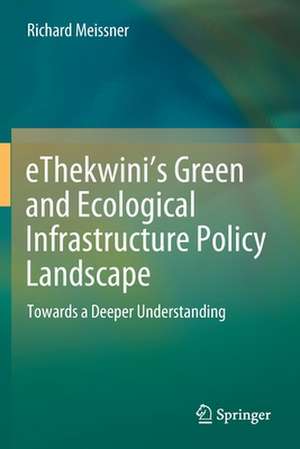eThekwini’s Green and Ecological Infrastructure Policy Landscape: Towards a Deeper Understanding
Autor Richard Meissneren Limba Engleză Paperback – sep 2021
| Toate formatele și edițiile | Preț | Express |
|---|---|---|
| Paperback (1) | 641.03 lei 6-8 săpt. | |
| Springer International Publishing – sep 2021 | 641.03 lei 6-8 săpt. | |
| Hardback (1) | 644.95 lei 3-5 săpt. | |
| Springer International Publishing – sep 2020 | 644.95 lei 3-5 săpt. |
Preț: 641.03 lei
Preț vechi: 754.15 lei
-15% Nou
Puncte Express: 962
Preț estimativ în valută:
122.68€ • 127.60$ • 101.28£
122.68€ • 127.60$ • 101.28£
Carte tipărită la comandă
Livrare economică 15-29 aprilie
Preluare comenzi: 021 569.72.76
Specificații
ISBN-13: 9783030530532
ISBN-10: 3030530531
Ilustrații: XVII, 288 p. 58 illus., 40 illus. in color.
Dimensiuni: 155 x 235 mm
Greutate: 0.44 kg
Ediția:1st ed. 2021
Editura: Springer International Publishing
Colecția Springer
Locul publicării:Cham, Switzerland
ISBN-10: 3030530531
Ilustrații: XVII, 288 p. 58 illus., 40 illus. in color.
Dimensiuni: 155 x 235 mm
Greutate: 0.44 kg
Ediția:1st ed. 2021
Editura: Springer International Publishing
Colecția Springer
Locul publicării:Cham, Switzerland
Cuprins
Chapter 1. Green and ecological infrastructure and water security at municipal level: An overview.- Chapter 2. Paradigms, theories and their utility.- Chapter 3. The PULSE3 analytical framework.- Chapter 4. eThekwini’s green and ecological infrastructure policy landscape.
Notă biografică
Richard Meissner is a senior researcher and water scientist at the Council for Scientific and Industrial Research (CSIR) in South Africa, where he holds a PhD in international politics from the University of Pretoria. Meissner specialises in the analysis of trans-boundary river basins focusing on the complexities and interactions between and among non-state actors (individuals, interest groups, businesses, and non-governmental organisations), international organisations, and state/government organs.
Textul de pe ultima copertă
This book offers the reader a deeper understanding of the eThekwini Metropolitan Municipality’s green and ecological infrastructure policy landscape. The author utilises the PULSE3 analytical framework to conduct an in-depth examination and to show how experts frame and implement the municipality’s green and ecological infrastructure strategies and projects. Although the initial purpose of this book was to investigate the role of green and ecological infrastructures in eThekwini’s water security aspirations, the author realised that climate change adaptation and mitigation play a more central role in motivating the municipality to develop and implement such science-driven projects. To be sure, science that is informed by a positivist paradigm, guides how, where and when the municipality should develop green and ecological infrastructures. Furthermore, a positivistic stance is generated in this policy landscape, where science and politics meet at a local government level, and the book offers an insight into the science–policy interface, as well as the normative and value orientations that positivism often ignores. The book also shows the usefulness of the PULSE3 framework and how it can assist scientists in all fields to gain a deeper understanding of the complications that are faced by humankind. This book fills a market gap by providing a view of how scientists think about problems and how to solve them by using established paradigms and theories.
Caracteristici
Discusses the role and function of paradigms and theories in the science–policy interface Presents the application of the PULSE3 framework in providing a deeper understanding of policy issues and any political level Contains a chapter on eThekwini’s green and ecological infrastructure policy landscape and how science informs policy
